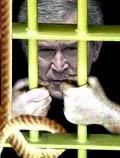| Find |
Thursday, 9 October 2008
Afghan war is not winnable; the news from US and British officials on the ground is bleak
“We’re not going to win this war,” a British commander in Afghanistan, Brig. Mark Carleton-Smith, recently disclosed to the Sunday Times. He suggests the most that can be hoped for is to dampen the insurgency, which he believes will still be active once the foreign armies have left unless efforts are made to negotiate with the Taleban, who, until now, have refused to sit down with “invaders.” These statements came on the heels of an article in the French weekly Le Canard Enchaîné quoting the British Ambassador to Afghanistan Sir Sherard Cowper-Coles as warning, “The American strategy is destined to fail.” According to the article, the ambassador believes that the coalition forces are part of the problem rather than the solution. Now that two of the most senior people on the spot have spoken up, the British people should be asking their government “What are we doing there?” and demanding a swift exit if they don’t get a satisfactory response. The news from US officials is almost as bleak. The American commander in charge of Afghanistan operations Gen. David McKiernan warned on the weekend of a flood of “well trained” militants pouring into Afghanistan eager to stand with insurgents against NATO. The fight is a lot tougher than anyone expected, he added. Yet, he’s doubtful that an Iraq-type troop “surge” would be effective, contradicting the views of the gung-ho McCain-Palin camp. “What I don’t think is needed — the word that I don’t use in Afghanistan is the word ‘surge,’” he told The Washington Independent. “There needs to be a sustained commitment of a variety of military and nonmilitary resources . . .” Afghan President Hamid Karzai seems to have got the message. He has reportedly asked Saudi Arabia to help facilitate a peace deal between his government and moderate Taleban elements. It’s a good idea but why did he and his US backers wait such a long time? Surely, they must have known early on that they couldn’t kill all their enemies and the day would come when they would have to reach a compromise. In fairness to Karzai, shortly after the taking of Kabul in 2001 he was keen to give amnesty to Taleban fighters willing to lay down their arms and allow Taleban leader Mullah Omar to live in dignity. But this idea was quickly nipped in the bud when the then US Defense Secretary Donald Rumsfeld warned him that if he did so, America’s cooperation (read money) would dry up. “To the extent that our goals are frustrated and opposed, we would prefer to work with other people,” Rumsfeld announced, leaving Karzai with no choice but to back down. More Australia’s Defense Minister Joel Fitzgibbon agrees that a decisive military victory may not be attainable, while NATO’s secretary-general wants to find a diplomatic solution to end the conflict.
Australia’s Defense Minister Joel Fitzgibbon agrees that a decisive military victory may not be attainable, while NATO’s secretary-general wants to find a diplomatic solution to end the conflict.
![[Zionazis-1.jpg]](https://blogger.googleusercontent.com/img/b/R29vZ2xl/AVvXsEg_x8DOGucgHQmfJJujuK_oYJdxhEnskhQqt-Og7lSk52HeaDQYzW8NQWfdpHmPgj_FJN0jJ3tz1prR1jVZHdHky2HDQxxcs4LVxX0DtAt3fG0sfRr6MDx7Sz8cJNjl0k0RS9TbCjangQ/s1600/Zionazis-1.jpg)




